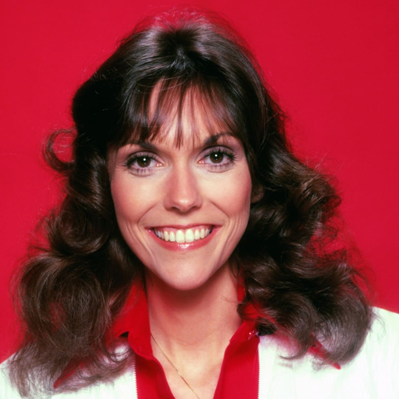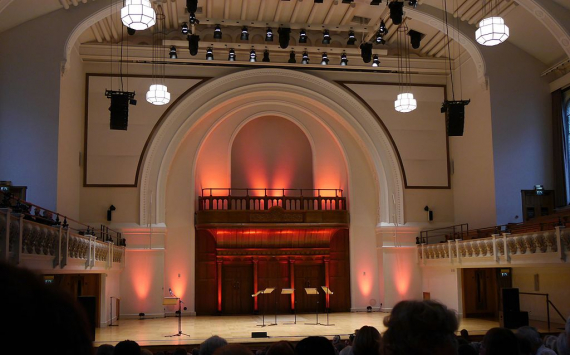- 1. Early life
- 2. The Carpenters

CARPENTER
Karen
American singer and drummer
Date of Birth: 2 March 1950
Date death: 4 February 1983
Age at the time of death: 32 years old
Zodiac sign: Pisces
Profession: Singer
Biography
Karen Carpenter was an American singer and drummer who with her elder brother Richard performed as the duo the Carpenters. With a distinctive three-octave contralto vocal range, she was praised by her peers as a great vocalist. Her struggle with and eventual death from anorexia would later raise awareness of eating disorders and body dysmorphia.
Carpenter was born in New Haven, Connecticut, and moved to Downey, California in 1963 with her family. She began to study the drums in high school and joined the Long Beach State choir after graduating. After several years of touring and recording, Carpenters were signed to A&M Records in 1969, achieving enormous commercial and critical success throughout the 1970s. Initially, Carpenter was the band's full-time drummer, but she gradually took the role of frontwoman as her drumming was reduced to a handful of live showcases or tracks on albums. While the Carpenters were on hiatus in the late 1970s, she recorded a solo album, which was released years after her death.
At the age of 32, Carpenter died of heart failure due to complications from anorexia nervosa, which was little-known at the time, and her death led to increased visibility and awareness of eating disorders. Interest in her life and death has spawned numerous documentaries and movies. Her work continues to attract praise, including appearing on Rolling Stone's 2010 list of the 100 greatest singers of all time.
Early life
Karen Anne Carpenter was born on March 2, 1950, at Grace New Haven Hospital (now called Yale New Haven Hospital) in New Haven, Connecticut, the daughter of Agnes Reuwer (née Tatum, March 5, 1915 – November 10, 1996) and Harold Bertram Carpenter (November 8, 1908 – October 15, 1988). Harold was born in Wuzhou, China, where his parents were missionaries. He was educated at boarding schools in England before finding work in the printing business.
Carpenter's only sibling, Richard, the elder by three years, developed an interest in music at an early age, becoming a piano prodigy. Karen's first words were "bye-bye" and "stop it", the latter spoken in response to Richard. She enjoyed dancing and by age four was enrolled in tap dancing and ballet classes.
The family moved in June 1963 to the Los Angeles suburb of Downey after Harold was offered a job there by a former business associate. Carpenter entered Downey High School in 1964 at age 14 and was a year younger than her classmates. She joined the school band, initially to avoid gym classes. Bruce Gifford, the conductor (who had previously taught her elder brother), gave her the glockenspiel, an instrument she disliked, and after admiring the performance of her friend and classmate, drummer Frankie Chavez (who had been playing from an early age and idolized jazz drummer Buddy Rich), she asked if she could play those instead. Carpenter wanted a Ludwig drum set because it was used by her favorite drummers, Joe Morello and Ringo Starr. Chavez persuaded her family to buy her a $300 (the equivalent of $2,600 in 2021) Ludwig kit, and he began to teach her how to play. Her enthusiasm for drumming led to teaching herself how to play complicated lines and studying the difference between traditional and matched grip. Within a year, she could play in complex time signatures, such as the 5
4 in Dave Brubeck's "Take Five".
Carpenter was initially nervous about performing in public, but said she "was too involved in the music to worry about it". She graduated from Downey High School in the spring of 1967, receiving the John Philip Sousa Band Award, and enrolled as a music major at Long Beach State where she performed in the college choir with Richard. The choir's director, Frank Pooler, said that Karen had a good voice that was particularly suited to pop and gave her lessons in order for her to develop a three-octave range.
The Carpenters
Carpenter's first band was Two Plus Two, an all-girl trio formed with friends from Downey High. They split up after she suggested that her brother Richard join the group. In 1965, Karen, Richard, and his college friend Wes Jacobs, a bassist and tuba player, formed the Dick Carpenter Trio. The band rehearsed daily, played jazz in nightclubs, and also appeared on the TV talent show Your All-American College Show. Richard was immediately impressed with his sister's musical talent, saying that she would "speedily maneuver the sticks as if she had been born in a drum factory". She did not sing at this point; instead, singer Margaret Shanor guested on some numbers. The trio signed a contract with RCA Records and recorded two instrumentals, but they were not released.
In April 1966, the Carpenters were invited to audition at a session with bassist Joe Osborn, well known for being part of the studio-musician collective the Wrecking Crew. Though she was initially expected to just be the drummer, Karen tried singing and impressed everyone there with her distinctive voice. Osborn signed a recording contract with her for his label, Magic Lamp Records; he was not particularly interested in Richard's involvement.
In 1967, Jacobs left the trio to study at the Juilliard School, and the Carpenter siblings were keen to try out other musical styles. Along with other musicians, including Gary Sims and John Bettis, the siblings formed the group Spectrum, which focused on a harmonious vocal sound and recorded many demo tapes in Osborn's garage studio, working out how to overdub voices onto multitrack tape. Many of those tapes were rejected by record companies. The group had difficulty attracting a live following, as their sound was too dissimilar from the hard rock and psychedelic rock then popular in clubs.
A&M Records finally signed the Carpenters to a recording contract in 1969. Karen started out as both the group's drummer and co-lead singer, and she originally sang all of her vocals from behind the drum set. She sang most of the songs on the band's first album, Offering (later retitled Ticket to Ride); her brother wrote ten of the album's thirteen songs and sang on five of them. The opening and concluding tracks were sung by both siblings in unison. As well as drumming, Karen played bass guitar on two songs, "All of My Life" and "Eve", under Osborn's guidance. On "All I Can Do", she played in 5/4 time, while "Your Wonderful Parade" featured multiple snare and bass drum overdubs to emulate the sound of a marching band. The track "Ticket to Ride", a Beatles cover song that later became the album's title track, was released as the Carpenters' first single; it reached No. 54 on the Billboard Hot 100. Their next album, 1970's Close to You, featured two hit singles: "(They Long to Be) Close to You" and "We've Only Just Begun". They peaked at No. 1 and No. 2, respectively, on the Hot 100.
Because she was just 5 feet 4 inches (1.63 m) tall, it was difficult for people in the audience to see Karen behind her kit. After reviews complained that the group had no focal point in live shows, Richard and manager Sherwin Bash persuaded her to stand at the microphone to sing the band's hits while another musician played the drums (former Disney Mouseketeer Cubby O'Brien served as the band's other drummer for many years). She initially struggled in live performances singing solo, as she felt more secure behind the drum kit. After the release of Now & Then in 1973, the albums tended to have Carpenter singing more and drumming less, and she did become the focal point of all records and live performances; Bash said "she was the one that people watched". Starting with the Carpenters' 1976 concert tour and continuing thereafter, she would perform a showcase in which she moved around the stage playing various configurations of drums. Her studio performances benefited from close miking that captured the nuances of her voice well. Though she had a three-octave range, many of the duo's hits prominently feature her lower contralto singing, leading her to quip, "The money's in the basement."
Carpenter always considered herself a "drummer who sang". She preferred Ludwig Drums, including the Ludwig SuperSensitive snare, which she favored greatly. However, she did not drum on every Carpenters recording. She was the only featured drummer on Ticket to Ride and on Now & Then, except for "Jambalaya". According to Hal Blaine, Karen played on many of the album cuts[4] and he played on most of the Carpenters' studio sessions when she did not play drums herself, but Karen was informed about Blaine's involvement and she approved on the basis that she and Richard wanted hit singles. The duo were happy for Blaine to take the role in the studio, as he was a respected session musician and it was easier to record Carpenter's guide vocal without it spilling onto the drum mics. Blaine complimented Karen's drumming skills, but believed her greatest strength was as a vocalist and thought himself more adept at working in a recording studio, which required a different approach from that of an onstage performance. On Made in America, Karen provided percussion on "Those Good Old Dreams" in tandem with Paulinho da Costa, and played drums on the song "When It's Gone (It's Just Gone)" in unison with Larrie Londin.
In the mid-1970s, Richard Carpenter developed an addiction to Quaaludes. The Carpenters frequently canceled tour dates, and they stopped touring altogether after their September 4, 1978 concert at the MGM Grand in Las Vegas. In 1980, Karen performed a medley of standards in a duet with Ella Fitzgerald on the Carpenters' television program Music, Music, Music. In 1981, after release of the Made in America album (which turned out to be their last), the Carpenters returned to the stage and went on some promotional tours, including an appearance for the BBC program Nationwide.
"Now" was the last song Carpenter recorded, in April 1982. Though Richard was concerned about her health, he still thought her voice sounded as good as ever.
Mentions in the news
Born in one day
(Tiger) .
Horoscope Pisces: horoscope for today, horoscope for tomorrow, horoscope for week, horoscope for month, horoscope for year.


















































